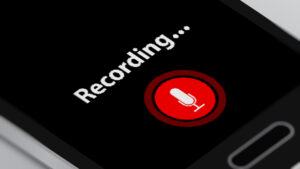 After a car accident, you may receive a request from an insurance adjuster for a recorded statement. With all the different things going on, including your injuries, you may wonder if this is something you are required to do. You may also feel pressure from the insurance adjuster to give in and make a statement.
After a car accident, you may receive a request from an insurance adjuster for a recorded statement. With all the different things going on, including your injuries, you may wonder if this is something you are required to do. You may also feel pressure from the insurance adjuster to give in and make a statement.
Unfortunately, giving a recorded statement may hurt your accident claim in several ways. Rather than talking to the insurance adjuster, you can request that they speak to your legal representation at Hines Law. We can take over communication with them so that you can focus on recovering.
It’s also smart to know more about how a recorded statement may hurt your compensation claim to see why it’s not a good idea.
Reasons to Avoid Giving a Recorded Statement to the At-Fault Party’s Insurance Company
If you are involved in a car accident in Georgia, the insurance adjuster from the at-fault party’s insurance company will probably contact you. They may request an oral or written statement about the accident that resulted in your claim.
If they request this, you may think you have to comply. However, you are under no obligation to talk to the insurance company for the other drive. Also, you will usually be better off if you avoid making a statement.
When an insurance adjuster requests a statement, the goal is probably to lock you into your story. Once they have it, they can tear it apart and use what you say to reduce or even deny your claim.
Usually, the adjuster asks leading questions to make it seem like it was your fault. They can take what you say out of context and even twist your words. If you happen to apologize in any way for any part of the accident, or if you get your facts mixed up, they can take it as an admission of guilt or even disqualify your claim due to inconsistencies.
If you are asked for information from the other driver’s insurance provider, it is best to let our car accident attorneys take over. They can help you figure out what you should and should not say to the adjuster and even handle communications for you.
Tips for Handling a Request from the At-Fault Driver’s Insurance Provider
You should let our experienced legal team handle any requests you receive from the insurance provider for the at-fault driver. There’s a good chance that making even a seemingly innocent statement that your words will be used against you in some way, even if you aren’t at fault for the accident.
The insurance adjuster may also claim that your claim will move along faster if you answer their requests. However, with a recorded statement, the adjuster has more power to undermine the claim you have made and reduce what you deserve when it comes to compensation.
If your case does make it to trial, the recorded statement you provided can be compared to what you say in court. If things don’t “match,” then the other side can use the irregularities to state that your claims are unreliable. Also, providing a recorded statement when you aren’t fully aware of your medical needs may result in the other party being able to deny future claims of complications or new symptoms.
It is best to avoid providing a statement to the other driver’s insurance company. If you want to do this, speak with our legal team first. We can ensure you don’t state anything that may harm your accident claim.
How Will Your Statement be Used Against You?
If you agree to talk to an insurance adjuster, who represents the at-fault driver, they will use their methods and techniques to find ways to use anything you say against you. Some of the most common ways they do this are by using your statement to:
- Assign blame to you for an admission of guilt
- Look for inconsistencies or errors in your story
- Dispute how severe your accident-related injuries were
Should You Give a Statement to Your Insurance Company?
In most situations, you will have to speak to your insurance provider. Usually, policies only require that you give a recorded statement if the adjuster requests one. Even if that’s the case, you should still report your accident to your insurer.
Contact Our Legal Team for Help with Your Accident Claim
If you are injured in an accident, it’s only natural to be overwhelmed and stressed. However, you need to be careful about what you say and who you talk to. It’s in your best interest to avoid giving a recorded statement to the at-fault party’s insurance provider. As you can see from the information above, there are several ways they can use it against you.
For help with your accident claim and dealing with the insurance company, reach out to us today.
